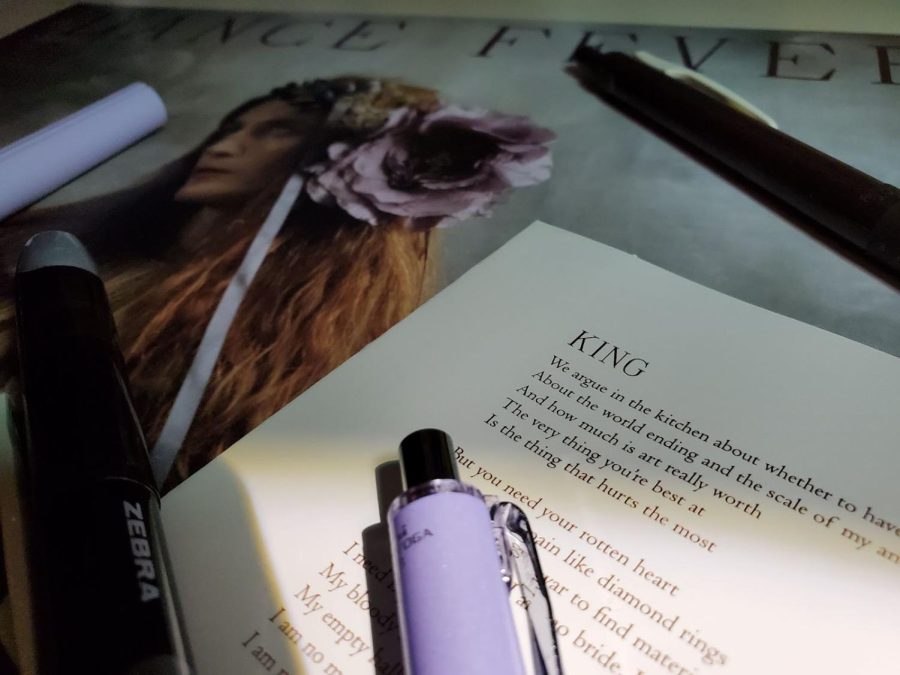We Are King: An Analysis of Florence + The Machine’s “King”
“King” lyrics featured in front of the cover to Florence and the Machine’s Dance Fever
December 9, 2022
Earlier this year, the band Florence + The Machine (consisting of Florence Welch, Isabella Summers, Rob Ackroyd, and Tom Monger) released a new album: Dance Fever. It veered slightly from Welch’s usual material, like a nightmare in comparison to the dream-like feel of Lungs and Ceremonials. Before they released the whole album, they released singles periodically up until the full album’s release date.
When Dance Fever was being teased, “King” was the very first single that was released. It reeks of modernity, of anxiety, and most of fear, covered up by strong belief and independence. Modernity is made clear in the first line, “We argue in the kitchen about whether to have children/ about the world ending and the scale of my ambition/ and how much is art really worth/ when the very thing you’re best at is the thing that hurts the most.” That argument that introduces the tune is one that, in the event of a future held in perpetual uncertainty, brought to a boiling point by the pandemic, is one that nearly every couple has had. Do you bring children into a world where they may not see fifty or forty, nor their lives, their hopes and dreams realized? Do you bring them, willingly, into disaster?
For millenials (based on my prior knowledge and experience), that argument ends with fickle results, resulting in factions of DINKs as well as two or three kidded families, but for this next generation of couples, the answer is overwhelmingly “NO,” in big, fat capitals. Most of my peers have had such bad experiences with the world, have a very pessimistic view of the future, or feel that it would be “irresponsible “ and “cruel” of them to pass on their deadly genetics to a child that does not understand what diabetes or endometriosis is, let alone ask for it, to bring a child into the world.
Building off of that argument, the song then declares, “I am no mother/ I am no bride/ I am king.” There is something so forceful about those three lines. She isn’t telling, she is declaring. The first time listener might assume that Florence holds a deep, persisting grudge against the institution of marriage and the throes of motherhood (with the very “witchy” tone of the album, that assumption is most definitely be valid in some cases), but I do not think she means that exactly.
In the chorus of the song, Florence illustrates, “I need my golden crown of sorrow/ My bloody sword to sing/ I need my empty halls to echo with grand self-mythology.” There, that is your explanation! In our modern world, there is so much expected of women. Not only do you have to be pretty, intelligent, and talented, you have to refrain from being bold and boisterous, as that is impolite. You have to be a mother, a good one, cooking and cleaning and taking care of the kids while your husband is at work, but you are also expected to be successful and have a career of your own. No matter how you spin it, society will always have criticisms at the ready for women who know what they want, who will do anything in their power to achieve that, especially if what they want doesn’t align with society’s arbitrary predictions and expectations.
I feel especially that society does not allow women to be angry, to feel furious when they are inflamed. There is something in us that tells us to bottle everything up and to keep it to ourselves, because we will never get what we want if we behave like children for that thing which we desire most, if we act like equality is a piece of forbidden candy hidden up on the tallest kitchen cabinet. They tell us that anger is unbecoming, and so we sit quietly and passively waste our lives as ignorant men continue to make our decisions for us, holding up that blessed hand to politely ask for that promised word in edgewise, but we are waved off and told to go outside and play, to amuse ourselves in our gardens and flowers. Men have treated us like children from the very beginning, and yet they expect us to act like adults! If we are to be treated like children, then what is stopping us from behaving like children? If we cannot be democratically respected, then we will be tyrannically respected.
“King” pokes fun at that: that male title is one of absolute rule, one that does not take no for an answer, one that gets what it wants when it wants it. It almost insinuates that the only way to be free of the restraints of patriarchal society is to be a man, or rather, a tyrant yourself. It also says that women long for control- over their bodies, their society, everything that has been previously denied to them, and points out that the only way to obtain control is to be a tyrant and take it for yourself.
Florence continues that feminist narrative in the next verse, declaring that “A woman is a changeling, always shifting shape/ just when you think you have it figured out, something new begins to take/ what strange claws are these scratching at my skin?/ I never knew my killer would be coming from within.” The first two lines of this verse could mean two things: 1). Florence is talking about the physical taxes you pay as a woman and how as you age, your appearance drastically changes, or 2.) she means all of what I just said, but in a metaphorical sense. Perhaps she is speaking to modern women’s desire to be more than a one-sided being: it is to be a mother or have a career. There is no option of both, so again, the solution to that problem is to be a tyrant and declare yourself king, because then, you can have both. To think that the freedom to choose what you want to do with your life as a woman is met with such heavy criticism that it is described by poets as a “killer” is a sad but not unexpected thought, especially with the overturning of Roe v. Wade.
At the very end, the song takes on the depressively pacified tone, saying that “I was never as good as I always thought I was/ but I knew how to dress it/ I was never satisfied/ it never let me go/ Just dragged me by my hair and back on with the show.” Something I read took this lyric literally. In that article’s theory, they took the song as coming directly from Florence’s perspective, that this was her ultimately coming to terms with choosing her career over having a family. To an extent, I believe this, but I also see it as women being sedated into thinking that they have control, that they have what they want, the first two lines being thoughts women are fed by the ones doing the sedating, the next two a solemn admittance of the effects of society’s demands and expectations for women, and the last two being society “putting women back where they want them” and “back on with the show.”
This song is certainly the 2022 version of No Doubt’s “Just A Girl.” It has a more specific message if you look at each lyric though the songwriter’s lens, but if you step back and look at how it coincides with the world at large, it means not just one women’s choice, but every woman’s choice of what she does with her life, and the drastic, tyrannical lengths women must go to to achieve what they want and still keep the snarling wolves of society at bay.
The release of “King” marks a turning point in contemporary music, in that young people are turning away from escapism and towards facing the reality that the world is currently in. Perhaps one day, we will be “king,” but until then, we must continue to wear our golden crowns of sorrow and wield our swords against those who wish to oppress us.




